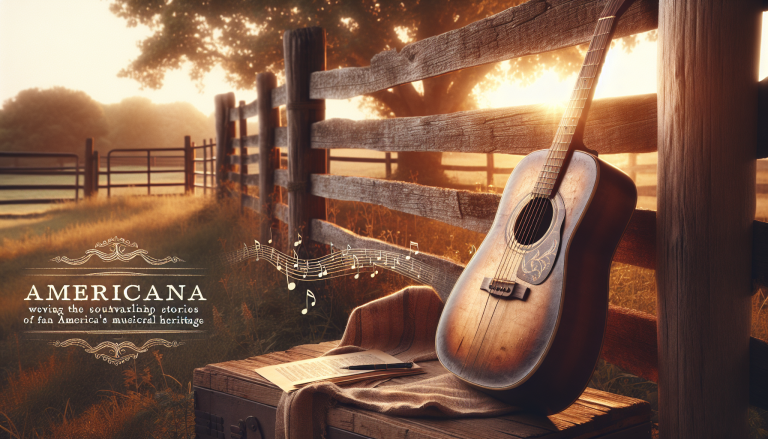The Roots and Rise of Americana Music
Americana music is the sonic tapestry where the past and present of American music converge, creating a rich, compelling narrative that is as authentic as it is enduring. If rock music is the bombastic roar of youth and rebellion, and heavy metal music the primal scream of intensity and power, Americana music is the heartfelt whisper of enduring stories passed down through generations. It’s a genre that embodies the sprawling landscapes and intricate cultural mosaic of the United States, blending roots music traditions into a singular, soulful voice.
Emerging from the mid-20th century, Americana music traces its lineage through a diverse collection of American musical styles: folk, country, blues, rhythm and blues, and gospel. These genres intertwine with the grit of working-class struggles and the enduring spirit of the American heartland, forming a musical expression that feels both timeless and immediate. While Americana as a defined genre gained momentum in the 1990s with the rise of alternative country and roots rock, its DNA stretches much further back, deeply connected to the earliest expressions of American music.
A Genre Carved from Tradition and Innovation

Americana is best described as more than just a genre—it’s a movement rooted in authenticity, narrative depth, and musical craftsmanship. It embraces traditional instrumentation such as acoustic guitars, fiddles, banjos, and harmonicas while allowing room for electric guitars and pedal steel to add emotional texture. The genre’s hallmark is its storytelling: lyrics that explore life’s complexities, from love and loss to social injustice and personal redemption.
Unlike the aggressive push of heavy metal music or the driven energy of rock music, Americana often evokes a reflective mood. Its songs conjure imagery of dusty highways, fading towns, and ordinary people living extraordinary lives. Observing life’s beauty and hardship with equal reverence, Americana creates a sweeping landscape of sound where each note is an invitation to pause and listen deeply.
Key Architects of Americana’s Sound and Spirit
Americana’s foundation rests on the work of pioneering artists who blended traditional roots with modern sensibilities. Johnny Cash stands as a towering figure; his deep, resonant voice and unflinching lyrical honesty forged a path for generations. With songs like “I Walk the Line” and “Folsom Prison Blues,” Cash’s music transcended simple categorization, pulling from country, rock, and blues to create a uniquely American sound.
In the 1960s and 1970s, artists like Gram Parsons earned the moniker “the father of Americana” by melding country and rock in a way that honored both traditions. Parsons’ work with The Byrds and the Flying Burrito Brothers introduced a seamless fusion of genres, culminating in his solo work that lent emotional depth and songwriting finesse to Americana’s evolving narrative.
Emmylou Harris followed closely, with a voice that carried the wistfulness and resilience emblematic of Americana. Her albums, such as “Wrecking Ball,” brought a modern sensitivity to traditional forms, introducing Americana to wider audiences. Later, bands like The Band and artists like Lucinda Williams and Steve Earle deepened the blend of rock’s urgency and country’s storytelling, bridging the gap between different musical worlds.
Defining Songs and Albums That Shaped Americana
Some definitive tracks stand as monuments in the Americana landscape. Gram Parsons’ “Return of the Grievous Angel” is a heartfelt lament that captures the spiritual and emotional core of the genre. Johnny Cash’s “At Folsom Prison” live album remains a visceral, raw document of Americana’s raw storytelling power.
Lucinda Williams’ “Car Wheels on a Gravel Road” is often hailed as a masterpiece that perfectly balances grit and grace. Her voice cuts through the song’s narratives of exile and longing with a clarity that’s both intimate and expansive. Steve Earle’s “Guitar Town” serves as a gritty snapshot of American small-town life, blending rock’s energy with country’s storytelling in a way that feels both classic and fresh.
The turn of the millennium saw the genre expand further, with artists like Jason Isbell and Brandy Clark pushing Americana forward with introspective lyrics and genre-blurring instrumentation. Their work illustrates Americana’s adaptability—not a genre trapped in the past, but a living, evolving form steeped in tradition.
Enduring Impact and Cultural Resonance
Americana music’s lasting effects extend beyond the airwaves and concert halls. It has become an essential counterpoint to the commercial sheen of mainstream American music industries. Its emphasis on authenticity and storytelling connects listeners to a shared cultural heritage, grounding the chaos of modern life in something more substantial and rooted.
Festivals and awards dedicated to Americana—such as the Americana Music Festival & Conference and the Americana Music Honors & Awards—reflect the genre’s growing influence. Not only do they celebrate its history, but they foster community for musicians and fans alike, valuing the craft of songwriting and musicianship over fleeting trends.
Moreover, Americana music has played a pivotal role in reviving and preserving traditional American music forms. By bridging roots music with contemporary narratives, it keeps the stories of past generations alive, breathing new life into old songs and styles, while encouraging innovation. As Radney Foster put it, “Americana keeps the fires burning where the story never ends.”
A Living Testament to American Music’s Heart
In its essence, Americana music is a celebration of the American experience—complex, raw, hopeful, and soulful. It speaks to the resilience found in the margins, the forgotten voices longing to be heard, and the beauty rooted in the ordinary. This genre sits at a crossroads where rock music’s rebellious spirit meets the deep traditions of country, blues, and folk, creating a soundscape that is both reverent and forward-thinking.
For anyone captivated by the rich tapestry of American music, indulgence in Americana’s enduring melodies offers a journey through time and heart. It’s a reminder that music, at its best, is storytelling—alive, evolving, and deeply human. Americana doesn’t just echo the past; it carries it into the future, a living soundtrack of America itself.